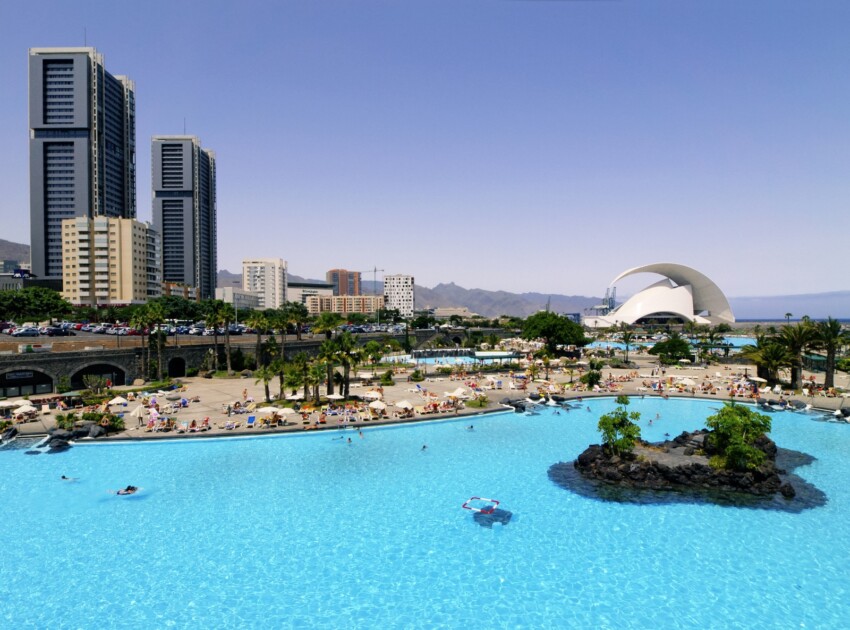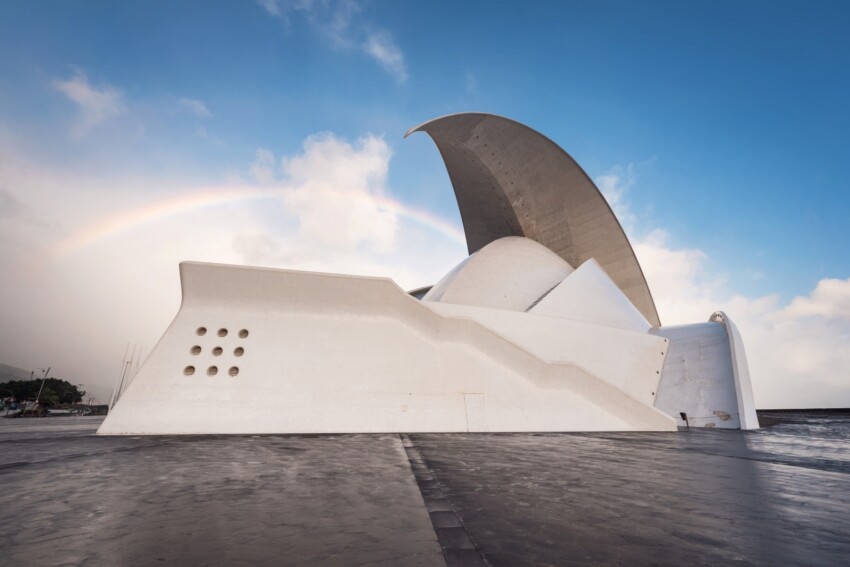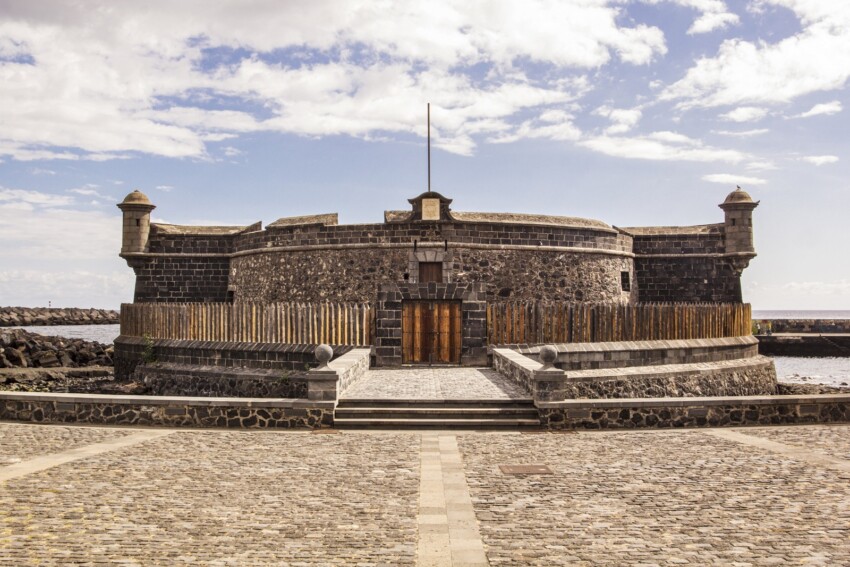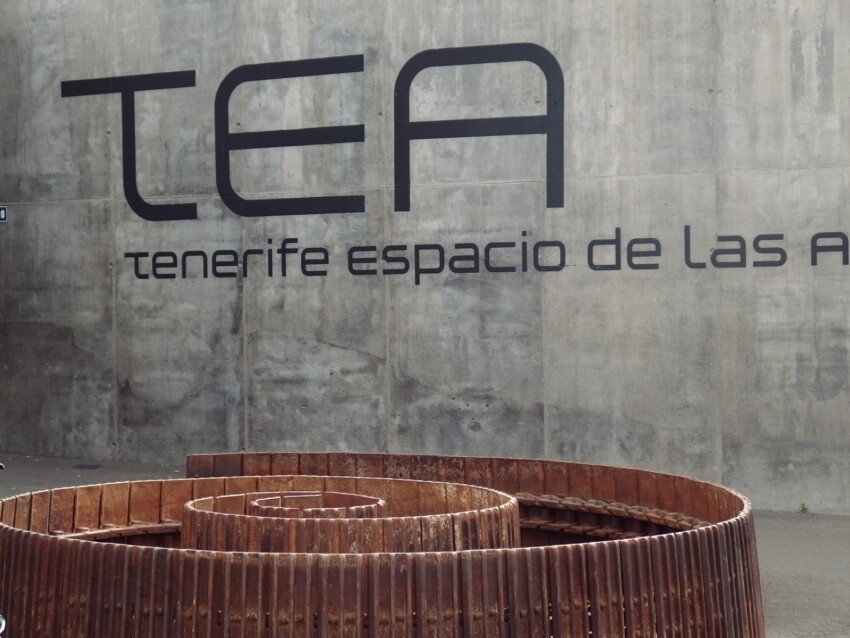

The lively and cosmopolitan coastal capital Santa Cruz is located at the north-eastern end of Tenerife and boasts one of the most important ports in the Atlantic Ocean.
With no less than 58 kilometres of city coastline, Santa Cruz is home to some of the island’s most famous beaches, including Playa Teresitas, a large beach of golden sand surrounded by palm trees, Playa Las Gaviotas, Playa Los Llanos, Playa de Anaga, the 2 Tabaiba beaches and the Cesar Manrique Maritime Park.
Numerous monuments, places of interest and museums enrich the charming Santa Cruz. Among the most important buildings are the Auditorio de Tenerife, Plaza de Pedro Schwartz, the Castillo de San Juan, the Iglesia de la Concepciónla Plaza de la Paz, the Tea and the Museo de Bellas Artes.
Nature lovers will appreciate the city’s green spaces such as Anaga Park, Saddleback Park, Downs Park, Sosa Rosa Park and Parque Garcia Sanabria.
Don’t miss the nearby city of San Cristobal de La Laguna, declared a UNESCO World Heritage Site.
Santa Cruz de Tenerife is home to the largest port in the western islands of the Canary Islands archipelago. Around the harbour area are wide boulevards marked by an important heritage of modernist architecture.

The beautiful and sensational Auditorium building, designed by archistar Santiago Calatrava and completed in 2003, is located on the Los Llanos seafront, between the Marine Park and the harbour, in Santa Cruz de Tenerife and can accommodate up to 1,616 people in the main auditorium crowned by a dome in addition to 422 seats in the chamber music room.
This urban landmark, made entirely of concrete, is characterised by the drama of its roof, made up of two intersecting cone segments that many identify as a wave or a half-moon, set 58 metres above the Auditorium’s main hall.
The base of the building forms a public square that allows communication between the different levels of the adjacent streets. The exterior has two terraces overlooking the sea.
As evocative as music, this building has no real façade but opens outwards, both towards the ocean and the city, and is a kind of giant organic sculpture.
The Auditorio de Tenerife is home to opera as well as rock, pop, classical, jazz and flamenco concerts. It is home to the Orquestra Sinfónica de Tenerife.

The Castle of San Juan Bautista, also known as the Black Castle, is located on the seafront of Santa Cruz de Tenerife near the Auditorio de Tenerife.
Built in 1644 to a design by the military engineer Leonardo Torriani on the southern flank of the island’s capital, in the area known as Caleta de los Negros, Il Castillo consists of a circular tower made of basalt stone with walls with loopholes. The structure is 30 metres in diameter and 8 metres high with walls 2.5 metres thick.
Access to the castle is protected by a small moat.
Every year in July, the Recreation of the Deeds of 25 July takes place near the castle, commemorating the failed attempt by British Admiral Horatio Nelson to invade the city and the archipelago.
The Parque Garcia Sanabria is one of the green lungs of Santa Cruz de Tenerife adorned with numerous exotic plants.
Built in 1926, the urban park, the largest in the Canary Islands, covers 67,000 square metres and boasts large green areas, numerous paths, fountains and statues. The palm trees and large trees contrast with the small hedges and fruit trees and give this oasis in the heart of the city a unique appearance.
The flower clock, made in Switzerland in 1958 and donated to the island of Tenerife by the Danish Consulate, is highly appreciated. Walking through the park, one can admire several monuments, including 13 contemporary sculptures exhibited during the first International Sculpture Salon, held in the city between 1973 and 1974.
The Museum of Fine Arts of Santa Cruz de Tenerife, divided into fourteen rooms, exhibits mainly paintings, with a large collection of 16th century Flemish paintings.
Among its most important works are the Triptych of Nava and Grimon by Flemish painter Pieter Coecke, San Andrés by José Rivera and Orpheus by Bueghel. Also of interest are works by Canary Island painters such as Gaspar de Quevedo, Cristóbal Hernández and Quintana y González Méndez.
The museum, made possible thanks to various private collections and funds, is housed in a classicist building from 1929 and features numerous columns and 10 busts of illustrious islanders along its façade.

The Tea, Tenerife Espacio de las Artes, is located in the centre of Santa Cruz de Tenerife, between the market of Nuestra Senora de Africa and the Church of the Conception, and is a cultural space aimed at promoting the island’s young talents.
This 20,000 square metre building designed by Swiss architects Herzog & de Meuron houses the Oscar Dominguez Contemporary Museum, the Alejandro Cioranescu Library and the Island’s Centre for Photography.
Tea’s architectural design connects the old part of the city with the modern part and creates a public square that is open and accessible to visitors, dynamic and participatory.
This new cultural area, opened in October 2008, is an inclusive space for the arts. To make the structure dynamic, the architects designed a series of small glass openings in the concrete façades, creating natural lighting with a pixel effect.
Inside the Tea there is also a reading and study room, an alternative cinema, several offices and a shop.
In the following map you can see the location of the main places of interest mentioned in this article.
There are many areas to choose from for sleeping in Santa Cruz de Tenerife. We would obviously recommend staying in the central area, although here the main disadvantage is the difficulty of getting around by car and parking. If you have a rental car, therefore, be sure to choose a property with parking, or at least one that is close to a public car park. Sleeping in the centre is convenient as you will have the feeling of really being in a city, giving a totally different mood to the classic seaside holiday.
You can also choose to sleep close to the harbour, which is a good choice if you arrive in Santa Cruz by ferry docking late in the evening, or conversely if you decide to leave Tenerife on an early morning ship.
Another highly recommended area of Santa Cruz de Tenerife is San Andres, a few kilometres north of the centre. It is a destination that sooner or later all tourists visiting the island touch on, as it is here that you will find the wonderful Las Teresitas beach, by far one of the most famous and unmissable in Tenerife.
We offer a selection of hotels at Santa Cruz de Tenerife to suit all categories of travellers. The most booked by tourists are the sea-facing hotels, often right on the beach. If you want to play it safe, choose one of the following: they are among the most booked hotels in Santa Cruz de Tenerife, sorted by number of reviews.
If you prefer space, privacy and the ability to prepare your own meals to a hotel holiday, book a holiday home at Santa Cruz de Tenerife. We recommend a few below, but in this case we advise you to book early because houses and apartments for rent at Santa Cruz de Tenerife are in high demand.
Santa Cruz de Tenerife is located on the north-eastern tip of the island, in a rather remote location. Getting there is, however, always very easy, as this is where the TF-1 and TF-5 roads begin, the first of which leads to the south, and thus to Las Americas – Los Cristianos – Costa Adeje, and the second runs along the north coast, passing important landmarks and towns such as North Airport, San Cristobal de la Laguna, Puerto de la Cruz and Icod de Los Vinos.
Therefore, getting there from the North airport is a matter of a little more than 10 minutes by car, taking the TF-5 eastbound, or 25 minutes by local public transport line number 20. If, on the other hand, you get there from Puerto de la Cruz, you will have to travel by car for about half an hour, again taking the TF-5 road and travelling north-east, or by bus number 100 or 103, which leaves from Tucán (in Puerto de la Cruz) and arrives at the Intercambiador Santa Cruz in front of the tourist office.
If, on the other hand, you want to get to Santa Cruz de Tenerife from the southern seaside resorts, you can use the buses 110 or 112 that leave every half an hour from Los Cristianos, in the El Duque area; it takes about an hour, but if you have a car it will take you about 45 minutes, travelling north along the TF-1 for about 75 kilometres.
What's the weather at Santa Cruz de Tenerife? Below are the temperatures and the weather forecast at Santa Cruz de Tenerife for the next few days.
Santa Cruz de Tenerife is located on the promontory that represents the entire north-eastern tip of the island, of which it occupies a large part of the southern coastline. It is about 20 kilometres fromTenerife North Airport and 35 kilometres from Puerto de la Cruz, while it takes about an hour to reach Playa de las Americas, covering a distance of about 80 kilometres.